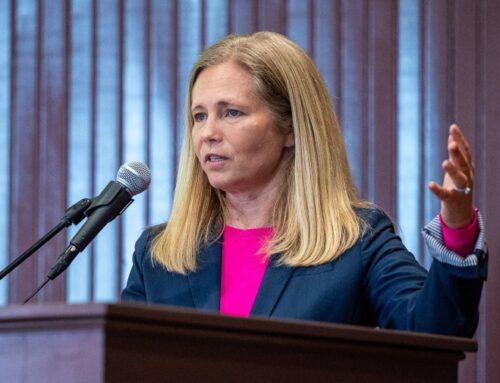Legislation could undermine Texas’ power grid ability to meet forecasted demand
April 21, 2025
ODESSA — Texas is growing. People are moving to the state in droves. Companies want to build their facilities here. Sustaining the growth will require nearly double the electricity the grid deploys today.
The state’s grid operator can meet the moment, Pablo Vegas, president and CEO of the Electric Reliability Council of Texas, told a panel of lawmakers last week.
So long as politics don’t interfere.
“I think the market as structured today is very well suited to support the growth trajectories that we’re seeing,” Vegas said. “And it’s not just the government support functions. It’s the fact that we have a very light regulatory environment that enables businesses to put their capital to work here with reasonable restrictions and reasonable requirements.”
Vegas’ comments were made as state lawmakers introduced a string of bills that would substantially alter the free trade and marginally regulated business environment that allow power generators and retailers to transact as they see fit, experts told The Texas Tribune.
Among those proposals are Senate Bills 388 and 819, sponsored by state Sens. Phil King, R-Weatherford, and Lois Kolkhorst, R-Brenham, respectively.
[Renewable energy companies face little regulation in Texas. A state lawmaker wants to change that.]King said his bill is needed to bolster what he calls reliable energy generation. Kolhorst has said her bill reins in the renewable energy industry, calling for the Public Utility Commission, which regulates electricity and some water and wastewater, to set more stringent rules around renewable energy development that don’t exist today.
Critics say the bills will interfere with a market that runs best when left alone.
Both bills have won approval from the Senate. For both bills to become law, they would need to be approved by the House and not be vetoed by Gov. Greg Abbott, who has called for an “all of the above” approach to energy.
When asked for comment, King’s office directed the Tribune to previous committee hearings discussing his bill.
Kolkhorst, in a statement sent Wednesday, said her bill would not halt construction of wind and solar projects. Instead, it “merely places guardrails to ensure every inch of Texas is not covered,” adding other states that have passed stricter wind and solar development controls kept building enough generation. Coastal areas where birds migrate, she said, are deserving of more protections.
“I have no doubt that with SB 819, Texas will be able to build the generation it needs to keep up with growth while also protecting Texas land,” she said.
ERCOT did not specify which bills it was most concerned with. But the message to lawmakers was clear: Any significant change to the state’s energy policy would alter the grid’s ability to meet demand.
“I do believe we’ve got a trajectory that’s going to bring important energy onto the grid,” Vegas said, referring to renewable energy and batteries. “And as I’ve always said, we need to balance it with the thermal resources to ensure we can always deliver reliability regardless of what the weather is.”
Lawmakers on the House State Affairs committee, where Vegas made his comments, appeared receptive. One lawmaker said the state should not show favoritism to particular types of energy generators.
“It sounds like we’re going to need every electron brought to bear in our system that we can possibly find, whether it’s from new generation, conservation or energy efficiency, or new distribution,” said state Rep. Rafael Anchía, D-Dallas. “We need all of it.”
Natural gas, solar, wind and battery storage compete to supply power to the grid. Every five minutes, they tell ERCOT how much energy they can produce and how much it costs. Grid operators, by law, pick up cheaper energy first, which solar currently regularly supplies. Although the prices made solar competitive, gas still takes up almost half of all generation.
Some lawmakers want to change that trend. King’s bill would require half of the grid’s supply as of 2026 to be dispatchable, namely natural gas, nuclear and coal-fired energy. Batteries, which King said don’t run constantly, were excluded. And for every megawatt of solar and wind, power generators must match it with a megawatt of natural gas if the state falls beneath the threshold set by King. They can purchase so-called dispatchable credits to comply if they can’t. It’s unclear who they would purchase the credits from.
King has said that federal subsidies for renewable energy development have already distorted the market.
Doug Lewin, author of the Texas Energy and Power newsletter and decades-long expert on the issue, said the effort ties the growth of Texas to the natural gas industry’s ability to expand its infrastructure.
The Senate “is saying the Texas economy can only grow as fast as gas turbine availability, and that just seems insane,” Lewin said.
Peter Hartley, an economist at Rice University, said a decades-fueled push for renewable energy, which he called unstable, is forcing lawmakers to make faster inroads for natural gas, which he called predictable.
“Now (legislators) have to turn around and subsidize some of the controllable stuff to make sure we got the ability to keep the system stable,” Hartley said.
It’s not the first time Texas policymakers and regulators have attempted to promote dispatchable energy infrastructure to offset the growth of renewables. In 2023, the utility commission explored a credit mechanism requiring anyone who sells power to consumers to pay generators for credits, which would be paid to nuclear, coal and gas generators to encourage construction for those types of plants.
Lawmakers rejected the plan. Instead, they created the Texas Energy Fund, a low-interest loan program companies could tap into and build their facilities — years away from operational.
Lewin said it is not up to lawmakers to correct the market. He noted incentives exist across multiple industries, not just renewable energy.
“It’s an absurd thing for a state legislature to try to balance out all of the tax incentives,” he said.
Joshua Rhoades, a research scientist at the University of Texas at Austin, said the bills would stifle the state’s ability to have the supply meet demand.
“I think we’d be severely constrained in our ability to build dispatchable as they define it,” he said. “And that would constrain our ability to build renewables, which then would constrain our ability to meet even this adjusted load forecast.”
Disclosure: Rice University and University of Texas at Austin have been financial supporters of The Texas Tribune, a nonprofit, nonpartisan news organization that is funded in part by donations from members, foundations and corporate sponsors. Financial supporters play no role in the Tribune’s journalism. Find a complete list of them here.
Tickets are on sale now for the 15th annual Texas Tribune Festival, Texas’ breakout ideas and politics event happening Nov. 13–15 in downtown Austin. Get tickets before May 1 and save big! TribFest 2025 is presented by JPMorganChase.
This article originally appeared in The Texas Tribune at https://www.texastribune.org/2025/04/16/texas-ercot-energy-demand-legislature/.
The Texas Tribune is a member-supported, nonpartisan newsroom informing and engaging Texans on state politics and policy. Learn more at texastribune.org.
COPYRIGHT 2025 BY CROSSROADS TODAY. ALL RIGHTS RESERVED. THIS MATERIAL MAY NOT BE PUBLISHED, BROADCAST, REWRITTEN OR REDISTRIBUTED.
Search
RECENT PRESS RELEASES
Related Post



